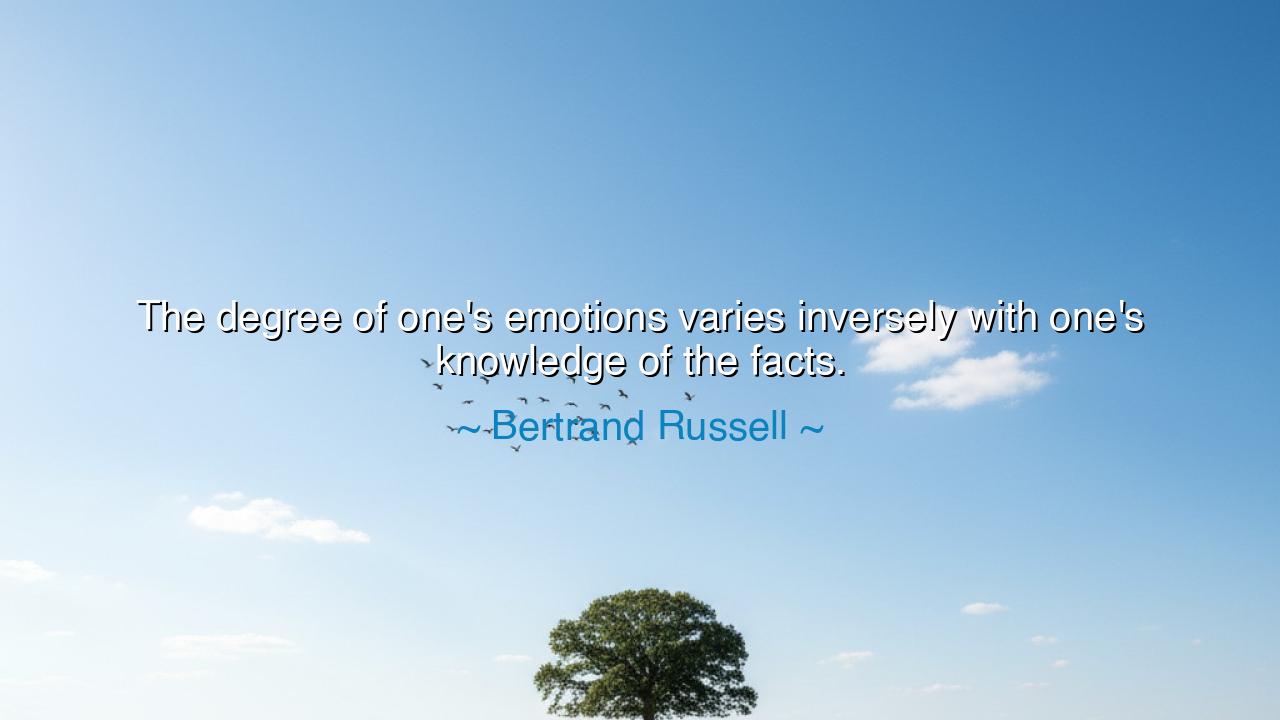
The degree of one's emotions varies inversely with one's






“The degree of one's emotions varies inversely with one's knowledge of the facts.” — Bertrand Russell
Hear these words, O seeker of truth, for they flow from the mind of Bertrand Russell, a philosopher who sought light amid the storms of passion and confusion. In this saying, he unveils a paradox both profound and eternal: that emotion, when untempered by knowledge, grows wild and destructive; yet as understanding deepens, the fires of blind feeling cool into clarity. He does not condemn emotion — for feeling is the pulse of life — but warns that ignorance feeds it with illusion. The less a man knows, the more fiercely he burns with false certainty; but when knowledge dawns, the heart learns humility, and passion becomes peace.
The origin of these words lies in Russell’s lifelong struggle to balance reason and emotion in a world trembling with upheaval. He lived through the great wars, when nations were swept by rage and zeal, and men destroyed one another in the name of half-truths. He saw how propaganda inflamed the masses — how ignorance made them slaves to passion, quick to hate, quick to fear. He understood that when people know little, they feel much, and when they know deeply, they feel differently. Knowledge refines emotion; it does not destroy it, but gives it purpose and proportion.
Look to the pages of history, and you will find proof of his wisdom. When the plague struck medieval Europe, terror seized the hearts of men. Lacking knowledge, they turned on the innocent — blaming strangers, witches, and even the wind. Fear bred cruelty, and ignorance became violence. Yet centuries later, when science revealed the true cause — when knowledge replaced superstition — humanity learned to fight disease with understanding, not fear. The same plague that once inspired panic now inspires compassion, research, and courage. Thus, as Russell taught, knowledge lessens blind emotion and transforms it into enlightened action.
Consider too the passions of our modern age, when men and women rage against one another over shadows of truth. So often, the loudest voices belong to those who know least. Their fury is born not of understanding, but of illusion. The wise do not shout — they listen. They do not hate — they discern. For they know that reality is complex, that truth wears many faces. The ignorant see the world in black and white; the learned see its infinite shades. And so, as knowledge increases, emotion finds balance, like a storm that, meeting the mountain, breaks into gentle rain.
Yet Russell’s words do not call for the death of emotion — far from it. He calls for its transformation. For passion guided by truth becomes a mighty force. The scientist who loves the world seeks to heal it through discovery. The reformer, armed with facts, changes hearts through reason, not rage. Even in love, knowledge deepens feeling: to truly know another — their fears, their hopes, their flaws — is to love more wisely, not less. Emotion and knowledge must dance together, as flame and light; for flame alone destroys, but flame with light warms and illuminates.
In this, Russell echoes the wisdom of the ancients — for even Socrates said that the unexamined life is not worth living. To examine is to understand; and to understand is to master the self. The man who knows the cause of his anger no longer obeys it blindly; the woman who understands her sorrow no longer drowns in it. In the mirror of knowledge, emotion reveals its true face — not chaos, but energy, waiting to be directed toward good.
Let this then be your lesson: before you speak in anger, seek to know. Before you condemn, seek to understand. When your heart burns with fury or fear, ask yourself — do I know the facts, or only the shadows? For every false certainty born of ignorance leads to pain, but every truth discovered through patience leads to peace. Study the world not to silence your emotions, but to purify them. Let your feelings serve truth, not the other way around.
So, child of reason and heart, remember Russell’s wisdom: as knowledge increases, emotion refines. The wise do not rage — they illuminate. They do not drown in passion — they steer it, as sailors guide their ships by the stars. Seek always the union of mind and heart, for in that union lies true power: the power to feel deeply, but act justly; to love fiercely, but wisely; and to live not as a slave to emotion, but as a master of understanding.






AAdministratorAdministrator
Welcome, honored guests. Please leave a comment, we will respond soon